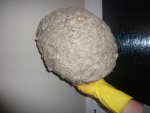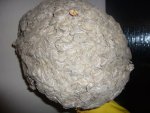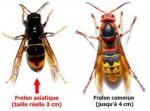Trunkles
Guest
Hi All....Are there any bee keepers out there or has Asian Hornet been discussed?
I ask because I am a bee keeper and Torbay Bee Keeper's Association , along with many other associations, is setting up an Asian Hornet Action Team to combat the threat the the Asian Hornet (AH) , latin name Vespa velutina (V.v) poses to honey bees and other insects in the UK It could wipe out our honey bees if it becomes established in the UK. We have fought off three attacks over the last two years but its going to be a case of vigilance because it is a real problem in France, Belgium, Spain and Potugal and it could get brought in any time.
Its thought the last attack was from a queen hornet brought in from southern France/Spain and may have traveled by accident in a caravan or motorhome or some camping equipment When it arrived in Woolacombe it started a nest in a hedge and attacked hives nearby.. Some of you may have seen the report by George McGavin on the One Show or the news item on BBC Spotlight.
Asian hornets hawk around hives and snatch honey bees out of the air. They bit of the legs head and abdomen and take the thorax (where all the muscles are) to feed to their young. They need the high protein to develop. AH doesn't just feed on honey bees. They take alll sorts of insect but honey bees are convenient as they gather at hives and as yet our honey bees have not learned to defend themselves from attack. They will eventually but its an evolutionary proces and will take an extremely long time
We need to get caravan and motorhome owners to appreciate that their vehicles may be ways for the AH to get to UK. The queens look for somewhere to hibernate in autumn, and in spring they look for somewhere to nest. Though they prefer high trees for their main nests they will go to any convenient hole or cavity to start a young colony (they will use shed and roof spaces) and then they move there growing colony to a place high in a tree when it is big enough. Some of you may have seen nests (about as big as a street waste bin but round) high in trees as you travel though France and spain. I certainly did last January as we travelled on our fist winter visit to the Algarve, but I never dreamed that my motorhome could provide the means where by a queen hornet could get to England......!
Anyway, please keeep a look out on your travells, and if you do see a large insect investigating your lockers and other spaces in your rigs please spray around some wasp killer, and maybe have a can handy when you get back to UK and clean out the unit before you put it away and get back to normal life.
AND if you see a large darkish brown wasplike insect fly away from your unit get in touch with your local Bee Keeping Association for advice.
There is an app available for Mobiles with which you can identify the Asian Hornet and also report a sighting to the correct authority.and I will post that later. In the mean time you can find lots on Youtube to find out what this hornet looks like.
I ask because I am a bee keeper and Torbay Bee Keeper's Association , along with many other associations, is setting up an Asian Hornet Action Team to combat the threat the the Asian Hornet (AH) , latin name Vespa velutina (V.v) poses to honey bees and other insects in the UK It could wipe out our honey bees if it becomes established in the UK. We have fought off three attacks over the last two years but its going to be a case of vigilance because it is a real problem in France, Belgium, Spain and Potugal and it could get brought in any time.
Its thought the last attack was from a queen hornet brought in from southern France/Spain and may have traveled by accident in a caravan or motorhome or some camping equipment When it arrived in Woolacombe it started a nest in a hedge and attacked hives nearby.. Some of you may have seen the report by George McGavin on the One Show or the news item on BBC Spotlight.
Asian hornets hawk around hives and snatch honey bees out of the air. They bit of the legs head and abdomen and take the thorax (where all the muscles are) to feed to their young. They need the high protein to develop. AH doesn't just feed on honey bees. They take alll sorts of insect but honey bees are convenient as they gather at hives and as yet our honey bees have not learned to defend themselves from attack. They will eventually but its an evolutionary proces and will take an extremely long time
We need to get caravan and motorhome owners to appreciate that their vehicles may be ways for the AH to get to UK. The queens look for somewhere to hibernate in autumn, and in spring they look for somewhere to nest. Though they prefer high trees for their main nests they will go to any convenient hole or cavity to start a young colony (they will use shed and roof spaces) and then they move there growing colony to a place high in a tree when it is big enough. Some of you may have seen nests (about as big as a street waste bin but round) high in trees as you travel though France and spain. I certainly did last January as we travelled on our fist winter visit to the Algarve, but I never dreamed that my motorhome could provide the means where by a queen hornet could get to England......!
Anyway, please keeep a look out on your travells, and if you do see a large insect investigating your lockers and other spaces in your rigs please spray around some wasp killer, and maybe have a can handy when you get back to UK and clean out the unit before you put it away and get back to normal life.
AND if you see a large darkish brown wasplike insect fly away from your unit get in touch with your local Bee Keeping Association for advice.
There is an app available for Mobiles with which you can identify the Asian Hornet and also report a sighting to the correct authority.and I will post that later. In the mean time you can find lots on Youtube to find out what this hornet looks like.



